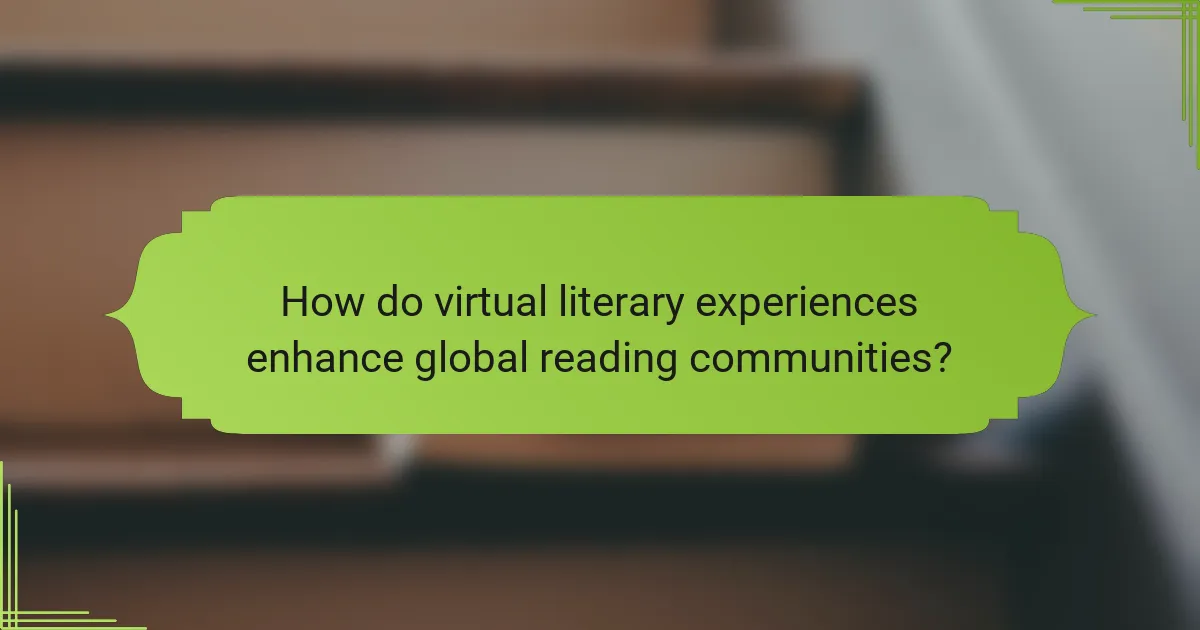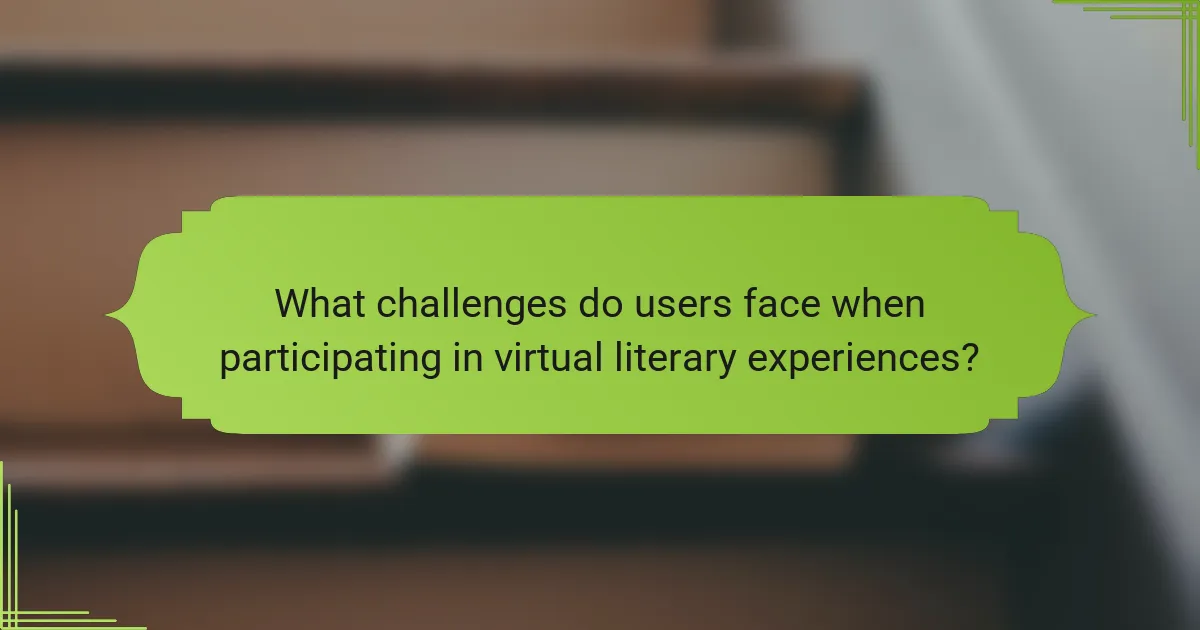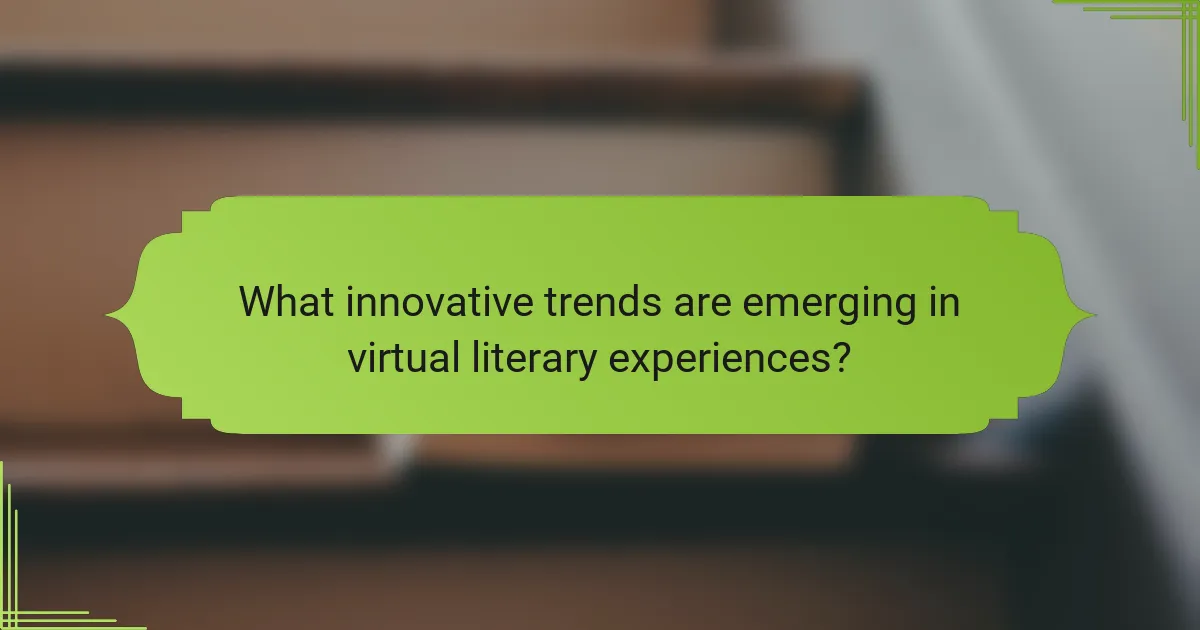Virtual literary experiences enhance global reading communities by fostering connection among diverse readers. They enable real-time interactions through platforms like Goodreads and Wattpad, promoting inclusivity and access to literature in multiple languages. These experiences also introduce innovative trends such as interactive fiction and immersive storytelling, expanding the boundaries of traditional literature. However, users may face challenges like technical issues and varying time zones that can impact participation.

How do virtual literary experiences enhance global reading communities?
Virtual literary experiences significantly enhance global reading communities by fostering connection and engagement among diverse readers. These platforms enable authors and readers to interact in real-time, breaking geographical barriers.
For instance, virtual book clubs and online author events allow participants from various countries to share their insights and perspectives, enriching discussions. Additionally, platforms offering immersive storytelling experiences, such as virtual reality readings, create unique environments that captivate audiences.
Furthermore, these experiences promote inclusivity by providing access to literature in multiple languages and formats. As a result, readers can explore a wider range of narratives and cultural contexts, strengthening their understanding of global literature.
Overall, virtual literary experiences cultivate a sense of belonging and community among book lovers worldwide, enhancing the collective appreciation of literature.
What are the key features of virtual literary platforms?
Virtual literary platforms offer features that enhance the reading experience and connect global book lovers. Key features include interactive reading communities, author engagement opportunities, curated book recommendations, and multimedia content integration. These platforms often provide virtual book clubs, live author events, and personalized reading lists based on user preferences. Enhanced accessibility through various devices allows readers to engage with literature anytime, anywhere.
Why do readers prefer virtual literary journeys over traditional formats?
Readers prefer virtual literary journeys over traditional formats due to enhanced accessibility and immersive experiences. Virtual platforms offer global access to diverse narratives, allowing readers to explore various cultures and perspectives. The interactive nature of these platforms, such as multimedia elements and community engagement, deepens the reading experience. Additionally, virtual formats often provide instant updates and recommendations, keeping readers connected to current literary trends. This combination of accessibility, interactivity, and real-time engagement makes virtual literary journeys increasingly appealing.

Which platforms offer the most engaging virtual literary experiences?
Several platforms offer engaging virtual literary experiences, including Goodreads, Wattpad, and Scribophile. Goodreads allows users to track reading progress and engage in discussions. Wattpad provides a space for writers to share stories and receive feedback. Scribophile focuses on critique and community support for writers. Each platform enhances the literary journey through unique features and community interactions.
How does the user experience differ across various virtual literary platforms?
User experience varies across virtual literary platforms based on interactivity, community engagement, and content accessibility. For instance, platforms like Goodreads emphasize social interactions, allowing users to share reviews and participate in discussions. Conversely, Kindle offers a more solitary experience, focusing on content consumption with features like note-taking and highlighting. Audiobook services such as Audible enhance user experience through immersive storytelling and convenience. Each platform’s unique attributes cater to different reader preferences, shaping how users engage with literature.
What types of interactive features are commonly found in virtual literary experiences?
Interactive features in virtual literary experiences include immersive storytelling, reader polls, live discussions, multimedia integration, gamified elements, and virtual book clubs. These features enhance engagement and foster community among global book lovers.

What benefits do virtual literary experiences provide for diverse audiences?
Virtual literary experiences offer diverse audiences enhanced accessibility, engagement, and community connection. They break geographical barriers, allowing readers from various backgrounds to explore literature together. These experiences often include interactive elements, such as live discussions and author Q&A sessions, fostering deeper connections with the material. Additionally, they promote inclusivity by featuring a wide range of voices and genres, catering to varied interests and cultural perspectives.
How can virtual literary experiences foster cross-cultural connections?
Virtual literary experiences can significantly enhance cross-cultural connections by allowing readers to engage with diverse narratives and perspectives. These experiences break geographical barriers, enabling global audiences to share insights and interpretations. By participating in virtual book clubs or author discussions, individuals can explore unique cultural contexts and foster empathy through storytelling. This exchange enriches understanding and appreciation of different cultures, promoting a sense of global community among book lovers.
Which demographics are most likely to engage with virtual literary events?
Younger adults and avid readers are most likely to engage with virtual literary events. Data shows that individuals aged 18-34 represent a significant portion of online literary event attendance. Additionally, those with higher education levels and a passion for reading tend to participate more actively. Engaging formats, such as author Q&As and interactive discussions, attract diverse demographics, enhancing participation across different age groups.

What challenges do users face when participating in virtual literary experiences?
Users face several challenges when participating in virtual literary experiences. Technical issues often disrupt engagement, including unstable internet connections and software glitches. Additionally, a lack of personal interaction can diminish the sense of community, making discussions feel less vibrant. Users may also struggle with navigating diverse platforms, leading to confusion and frustration. Lastly, varying time zones can complicate participation in live events, limiting access for global audiences.
How do technical issues impact the enjoyment of virtual literary events?
Technical issues significantly detract from the enjoyment of virtual literary events. Connectivity problems can interrupt live readings, making it difficult for attendees to engage fully. Audio and video quality issues may hinder the experience, causing frustration among participants. Additionally, platform glitches can lead to missed interactions, reducing the sense of community. These factors collectively diminish the overall satisfaction of virtual literary experiences.
What are common barriers to access for global readers?
Common barriers to access for global readers include language differences, limited internet connectivity, and lack of availability of diverse literature. These challenges hinder engagement with virtual literary experiences. Additionally, cultural differences can affect reader preferences and accessibility to certain genres. As a result, global book lovers may struggle to fully participate in literary journeys.

How do authors and publishers leverage virtual literary experiences?
Authors and publishers leverage virtual literary experiences to engage global audiences and enhance reader interaction. Virtual book tours, online readings, and interactive platforms allow authors to connect with fans worldwide. Publishers utilize social media and digital events to promote new releases, increasing visibility and sales.
These experiences often include live Q&A sessions, enabling real-time feedback and fostering community. As a result, authors can build loyal followings and publishers can diversify their marketing strategies. Virtual experiences also provide accessibility, allowing readers from various backgrounds to participate without geographical limitations.
What strategies do authors use to promote their work in virtual settings?
Authors use various strategies to promote their work in virtual settings, including social media engagement, virtual book tours, and online literary events. Social media platforms allow authors to connect with readers directly, share updates, and build a community. Virtual book tours enable authors to reach global audiences without geographical limitations. Online literary events, such as webinars and live readings, foster interaction and enhance visibility. These methods leverage digital tools to expand an author’s reach and engage with a diverse readership.
How can publishers maximize audience engagement through virtual events?
Publishers can maximize audience engagement through virtual events by creating interactive and immersive experiences. Utilizing features like live Q&A sessions, author meet-and-greets, and themed discussions fosters a sense of community. Engaging content, such as exclusive previews or behind-the-scenes insights, keeps audiences invested. Promoting events across social media platforms enhances visibility and attracts diverse participants. Additionally, leveraging data analytics to understand audience preferences allows for tailored experiences that resonate with global book lovers.

What innovative trends are emerging in virtual literary experiences?
Innovative trends in virtual literary experiences include immersive storytelling, interactive platforms, and augmented reality features. These trends enhance engagement by allowing readers to explore narratives in new ways. For instance, virtual reality environments create a sense of presence within the story, while interactive elements enable readers to influence plot outcomes. Additionally, global book clubs leverage technology to connect diverse audiences, fostering community through shared literary experiences. These advancements represent a shift towards more dynamic and participatory forms of literature.
How are augmented reality and virtual reality shaping the future of literary experiences?
Augmented reality and virtual reality are transforming literary experiences by creating immersive environments for readers. These technologies allow users to interact with narratives in ways that traditional formats cannot. For instance, readers can explore virtual worlds that bring stories to life, enhancing engagement and emotional connection.
Virtual literary experiences enable global book lovers to connect through shared adventures, regardless of location. This democratization of access fosters a diverse literary community. As a result, readers can participate in interactive storytelling, where choices influence plot outcomes.
Additionally, these technologies support unique attributes like gamification, making reading more dynamic. Users can unlock content, earn rewards, and collaborate with others, enriching the literary journey. Overall, augmented and virtual reality are reshaping how stories are consumed and experienced, paving the way for innovative literary formats.
What role do social media platforms play in enhancing virtual literary journeys?
Social media platforms significantly enhance virtual literary journeys by fostering community engagement and facilitating access to diverse literary content. They allow readers to connect with authors, participate in discussions, and share recommendations. Platforms like Instagram and Twitter promote book-related content through visually appealing posts and hashtags, increasing visibility for both new and classic literature. Additionally, live readings and virtual book clubs on these platforms create immersive experiences, enriching the overall journey for global book lovers.

Which unique literary genres thrive in virtual formats?
Unique literary genres that thrive in virtual formats include interactive fiction, digital poetry, and immersive storytelling. These genres leverage technology to enhance reader engagement and experience.
Interactive fiction allows readers to influence the narrative through choices, creating a personalized journey. Digital poetry often incorporates multimedia elements, blending text with visuals and sound to evoke emotions. Immersive storytelling utilizes virtual reality to place readers in the story’s environment, offering a unique perspective.
These genres reflect a shift in how literature is consumed, appealing to tech-savvy audiences seeking innovative experiences. As a result, they expand the boundaries of traditional storytelling, fostering a dynamic literary landscape.
How do genre-specific virtual events cater to niche audiences?
Genre-specific virtual events effectively engage niche audiences by providing tailored experiences that resonate with their unique interests. These events often feature curated content, such as author Q&As, themed discussions, and interactive workshops, fostering a sense of community among participants. For instance, a virtual event centered on fantasy literature might include exclusive previews of upcoming releases and discussions with genre-specific authors, enhancing the overall experience. Additionally, these events leverage technology to create immersive environments, allowing attendees to connect with like-minded individuals globally. This targeted approach not only satisfies the audience’s specific preferences but also encourages deeper engagement with the literary community.
What are the benefits of exploring lesser-known literary genres online?
Exploring lesser-known literary genres online offers diverse benefits for readers. It broadens literary horizons and introduces unique narratives that challenge conventional storytelling. Engaging with these genres fosters creativity and enhances critical thinking skills. Readers can discover hidden gems, enriching their reading experience and cultural understanding. Additionally, online platforms provide access to global voices, promoting inclusivity in literature.
How can readers discover new authors through virtual literary experiences?
Readers can discover new authors through virtual literary experiences by participating in online book clubs, author Q&A sessions, and digital literary festivals. These platforms facilitate direct engagement with authors and provide exposure to diverse literary voices. Virtual experiences often feature unique attributes like interactive discussions and themed events, enhancing reader engagement and broadening their literary horizons. As a result, readers can explore genres and styles they might not encounter in traditional settings, fostering a deeper appreciation for global literature.
What are the best practices for maximizing enjoyment in virtual literary journeys?
To maximize enjoyment in virtual literary journeys, engage actively with the content and community. Participate in discussions, explore diverse genres, and utilize multimedia elements like author interviews or interactive maps.
Consider setting a specific theme for each journey to deepen focus and connection. For example, explore a particular culture or historical period through its literature.
Incorporate technology by using apps or platforms that enhance the reading experience, such as augmented reality features or virtual book clubs.
Lastly, maintain a flexible reading schedule to savor each literary experience without feeling rushed, allowing for deeper immersion in the narratives.